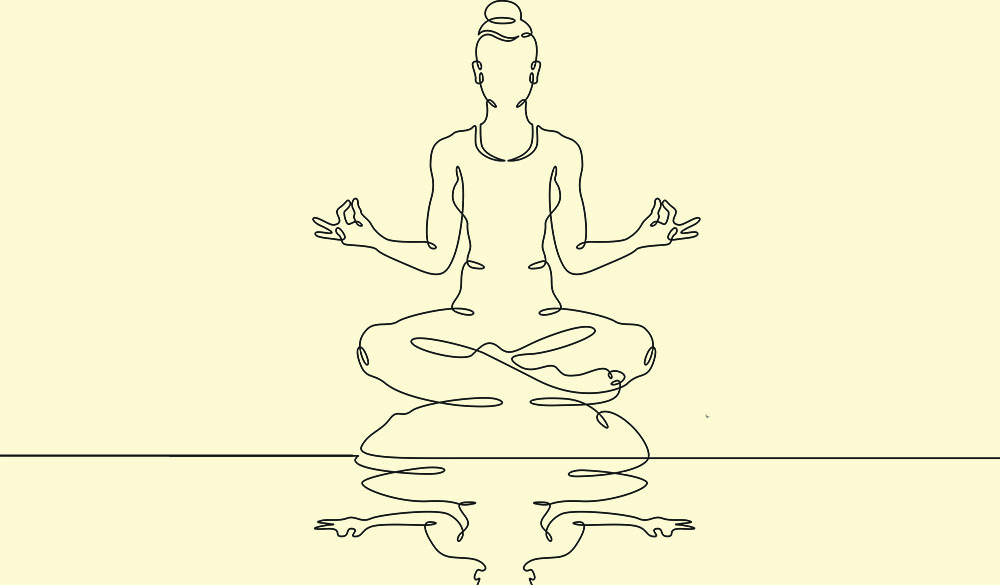Jenny Hall
Verses from the Dhammapada 27
It's not surprising that many abandon meditation. It's not a means to achieving our desires or goals. Meditation is only truly discovered when ‘I’ am out of the way.

“Avoid both folly and greed. Meditating earnestly the watchful man acquires great happiness”.
This verse points to Right Meditation (at-one-ment), a step on the Buddha’s Noble Eightfold Path.
“Avoid both folly and greed”.
There was once a lama called Geshe Ben. He was responsible for an ancient temple. He lived a simple life in the village hermitage. One day a rich merchant heard about Geshe Ben’s humility and compassion. He sent his servant to the hermitage to say that he would be paying a visit. Geshe Ben was flattered that such an affluent man intended to meet him. He started to hope that the merchant would become the temple’s benefactor. He gathered all the villagers together and told them they must work hard to improve the temple in order to impress the august visitor. The daily routine was abandoned. The quiet periods of sitting meditation ceased. Everyone frantically took up brushes, cloths and tools. They cleaned, painted, repaired and tidied. As they worked, they thought of how impressed the visitor would be. They imagined all the money he would bestow on the temple.
However, the night before the merchant’s visit Geshe Ben was unable to sleep. He tossed and turned. He wondered why he felt so restless. Suddenly the answer came to him. He had been so full of thoughts of impressing his visitor and a possible donation that he had failed to give himself wholeheartedly to the simple daily tasks and meditation.
In the morning, he brushed up some dust and ashes and scattered them around the temple. It soon looked shabby again. When the merchant arrived, Geshe Ben quickly led him to the hermitage. They sat in meditation together. Afterwards, Geshe Ben said ‘May all sentient beings be liberated from their suffering’. The merchant was so impressed by Geshe Ben that he presented him with a generous gift for the temple. When he had gone, the villagers demanded to know why he hadn’t been taken into the temple. They also wanted to know who had destroyed all their hard work. Geshe Ben smiled and said ‘Suffering can only be alleviated by attending to the ‘inner temple’ not the outer one.
There is a deep longing within us. Our folly, like Geshe Ben’s, is to attempt to assuage it by devising and chasing after endless projects, symbolised by the outer temple in the story. We feel they will improve or add to our lives. The greed for such projects is endless. However, being ephemeral, such striving fails to bring satisfaction.
“Meditating earnestly… “
Over the last few years, meditation has often been presented as a means to such fulfilment. It is recommended for a variety of problems from anxiety to the inability to achieve our goals in life. Some schools have started to include it in their curriculum. However, many end up dropping meditation complaining that it doesn’t work! It's not surprising that they abandon it. It's not a means to achieving our desires or goals. It is only truly discovered when ‘I’ am out of the way.
The Zen training guides us into this wholehearted giving ourselves away into both the daily life price and Zazen. Both support each other.
“… the watchful man…”
The Tibetan word for meditation is ‘Gom’ meaning ‘to become familiar with’. We sit and give ourselves wholeheartedly into counting each breath “One… two… three”. Perhaps then a thought arises “Oh this is very boring”. “One… two… three… four”. Another thought arises “Oh no! I have that scan tomorrow. What if I have cancer?” We discover that we don’t want to feel bored or frightened. We’d rather distract ourselves by phoning a friend or pouring a glass of wine. This is when we perhaps give up.
If we resist this temptation and continue to sit, we discover that these emotions and the thoughts they create come and go. We begin to see that ‘I’ am not a permanent entity.
“.. Acquires great happiness”.
We also discover that if we meet the emotions, really delve down into them and allow them to work on us, a glimpse of our true nature, ‘choiceless awareness’, opens.
This spacious clarity was there all the time. It is like the sun. It is always there. Our feelings and thoughts are like the clouds that obscure it. With ‘me’ emptied out, our whole life becomes meditation. As we give ourselves wholeheartedly into whatever is arising, there is at-one-ment with all. No longer are we separate. Compassion flows quite naturally. All needs are seen and met.
A woman lived next door to an old man whose wife had recently died. She sent her little boy round to see if he needed anything. When he returned, she asked him what happened. The little boy said “I sat on his lap and helped him to cry”.
Such sharing is our “great happiness”.
































































